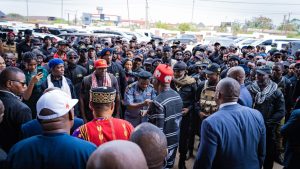Fifteen Kidnapped Victims Regain Freedom After Five Days in Captivity in Enugu
In the early hours of Thursday, April 17, 2025, a wave of relief swept through the quiet agrarian community of Ibagwa-Agu in Nsukka Local Government Area of Enugu State. Fifteen individuals who had been kidnapped by suspected Fulani herdsmen five days earlier were finally released, bringing an end to a harrowing period of fear, anguish, and uncertainty.
The victims, mostly local residents, had been returning from a burial ceremony in a neighboring community when their hired minibus was ambushed along a remote farm road. The abduction shocked the local population, triggered urgent security responses, and stirred fresh debates about the growing security threats in rural communities across the southeastern region of Nigeria.
According to eyewitness accounts and local leaders, the kidnapping occurred on Saturday, April 12, as the victims made their way back to Ibagwa-Agu from a funeral they had attended in nearby Eha-Alumona. The 13 individuals in the bus, along with a father and son trailing behind on a motorcycle, were intercepted near a remote farm settlement infamous for poor road infrastructure and sparse security presence.
The attackers, armed and masked, reportedly fired warning shots into the air before forcing the victims into the surrounding bushland. Panic quickly spread through Ibagwa-Agu as families began raising the alarm. Within hours, news of the abduction reached the ears of Hon. Chidi Obetta, the federal lawmaker representing Nsukka/Igbo-Eze South.
YOU MAY READ
Kidnappers Kill APC National Director After Collecting N90 Million Ransom
Speaking to journalists shortly after the victims’ release, Hon. Obetta described the moment he received the initial distress call: “It was like a bad dream. I knew we had to act fast, but also smart. These criminals were not local; they came with clear intent and a strategy.”
Though the victims have not yet granted detailed public interviews, close relatives and community leaders familiar with the case have revealed some of what transpired during those five days. The captives were marched deep into the forest, stripped of phones and personal belongings, and subjected to threats of violence. The kidnappers reportedly demanded ransoms ranging from ₦5 million to ₦10 million per victim—a figure far beyond the reach of most people in the rural community.
One of the victims, a local schoolteacher, was said to have pleaded with the kidnappers, explaining that the group had merely gone to bury a deceased neighbor and had no financial means to meet their demands. Whether this emotional appeal had any bearing on the eventual release remains unclear.
What is known, however, is that no large-scale ransom was paid, suggesting that community pressure, behind-the-scenes negotiation, and possibly the discreet involvement of security operatives helped facilitate the safe return of the abductees.
YOU MAY READ
Medical doctor kidnapped in Anambra State
In his official statement following the release of the victims, Hon. Chidi Obetta expressed deep relief and commended the tireless efforts of local leaders, security agents, and concerned citizens.
“I am thankful to God for their safe return. My joy was overwhelming when I received confirmation that all fifteen were alive and accounted for. It was a complex and risky operation, but we had to stay discreet to avoid further endangering lives,” he stated.
Obetta emphasized that the abduction exposed a grave vulnerability in the area’s security infrastructure. “We cannot afford to be reactive anymore. This incident is a clear wake-up call,” he said, urging the Police, DSS, NSCDC, and the Nigerian Army to launch sustained patrols and intelligence operations in the region.
He also appealed to Enugu State Governor Peter Mbah to activate the Neighbourhood Watch and local vigilante groups to safeguard Ibagwa-Agu and adjoining communities.
Hon. Obetta’s statement also drew attention to a deeper crisis at play. Ibagwa-Agu is not just a sleepy rural community—it is a vital agricultural belt, supplying yams, cassava, maize, palm oil, and other staples to markets across Enugu State and beyond.
YOU MAY READ
Bomb, guns, others recovered as security operatives net more hoodlums in Anambra, recover kidnapped lawmaker’s car
“With insecurity now threatening farmers and traders, we’re looking at a ripple effect that could affect food supply chains across the region,” he warned.
The farm settlement where the victims were kidnapped is known to house dozens of local farms and cooperatives. The fear now is that farmers may abandon their fields for safety, a scenario that would spell economic and nutritional disaster for the area.
The days following the kidnapping were tense for residents of Ibagwa-Agu. Markets ran half-empty, school attendance dropped, and many avoided traveling through the affected area. Some families reportedly began sending their children to stay with relatives in Nsukka town and Enugu city, fearing further attacks.
Upon news of the victims’ release, villagers gathered in churches and town halls to pray, celebrate, and share hugs and tears. Yet, beneath the joy, there is anger—at what they see as government neglect and a security system unprepared for the rural terror that now threatens their livelihoods.
Elder Jonas Ogbonna, a community elder and member of the traditional council, voiced what many were feeling: “We cannot be burying our people today and living in fear of being kidnapped tomorrow. This is not the Nigeria we voted for.”
YOU MAY READ
Breaking News: Anambra Lawmaker kidnapped in Onitsha
Adding to the complexity of the situation is the allegation that the kidnappers may not be local bandits but foreign mercenaries. Intelligence reports cited by Hon. Obetta suggest a pattern similar to attacks seen in Uzo-Uwani and parts of Benue and Kogi States, where Fulani herdsmen linked to transnational criminal networks have established operational bases in forests and farmlands.
“There is a clear and present danger of these groups forming enclaves in our region,” Obetta warned. “They exploit the geography—dense bushes, poor roads, and lack of policing—to carry out targeted operations.”
Security analysts have long noted the migration of armed herders and foreign militants from the Sahel region into parts of Nigeria, often using nomadic routes and cattle-trading corridors as cover. With limited government presence in rural areas, these actors can embed themselves within local communities or forests, making detection and response extremely difficult.
The Ibagwa-Agu abduction has reignited calls for a coordinated regional security framework among southeastern states. Critics argue that the current federal policing model is inadequate to respond to the sophisticated and mobile nature of rural banditry.
“There is a need for a South East Security Summit,” said Dr. Nonso Ezeani, a public affairs analyst based in Nsukka. “We need community policing structures backed by state legislation and supported with technology—drones, surveillance cameras, GPS tracking.”
Indeed, some have pointed to Amotekun in the Southwest and Ebube Agu in the Southeast as blueprints for grassroots-level security, albeit with funding and coordination challenges.
The incident also has political implications, especially for the Enugu State Government and the ruling party in the region. Critics have accused the state of being slow to respond and failing to anticipate the growing insecurity despite warnings from civil society and traditional rulers.
“We have been talking about the need for farm security and rural patrols for over two years,” said Chief Odogwu Eze, a local youth leader. “Must we always wait for lives to be threatened before we act?”
The opposition, too, has weighed in, with some questioning the effectiveness of the state’s security budget and demanding transparency in how local funds allocated for neighborhood watch programs are being spent.
Despite the trauma and fear, the safe return of the kidnapped victims has brought a flicker of hope. Community groups are rallying to provide counseling and reintegration support for the victims. Local churches are organizing vigils, prayer sessions, and town hall meetings to rebuild morale and reassert communal bonds.
In one such event at St. John’s Catholic Church in Ibagwa-Agu, the parish priest urged residents not to give in to fear. “Let us remember that evil thrives when good people do nothing. We must protect our own, speak out, and support one another.”
The road ahead for Ibagwa-Agu and similar rural communities in Enugu State will require more than temporary military deployment or political statements. There is a need for a long-term rural security strategy that includes:
The release of the 15 victims is cause for celebration, but it should also be a moment of reflection. Nigeria’s rural communities, once bastions of peace and productivity, are now under threat from a new wave of crime that disregards boundaries, cultures, and human decency.
Unless urgent and sustained action is taken, the next news headline may not end in freedom but in tragedy.
For now, Ibagwa-Agu breathes a sigh of relief. But the question lingers: for how long?





